How To Clean Hardened Oil Paint Brushes
Many artists compromise the quality of their brushes either because they do not know how to clean them properly, or because cleaning them is considered to be a tedious and unimportant chore when compared to the creative act of painting. But your brushes are the tools with which you express your soul and imagination – taking the time to give them a bit of care to preserve your paintbrushes can save you money in the long run, and can also make painting easier as you will not have to contend with dried, crispy bristles to create your artwork.
Table of Content
- 1 How to Clean Oil Paint Brushes the Right Way
- 2 Looking After Your Paintbrushes
- 3 Cleaning Oil Paint Brushes
- 3.1 How to Clean Oil Paintbrushes with a Solvent
- 3.2 Baby Oil as a Paint Brush Cleaner
- 3.3 How to Clean Oil Paint off Brushes with Linseed Oil
- 3.4 Cleaning Your Palette with Oil
- 3.5 Dish Soap
- 3.6 How to Clean Dried Paint Brushes
- 3.7 Drying Your Brush
- 4 Precautions
- 5 Frequently Asked Questions
- 5.1 What Do You Clean Oil Paint Brushes With?
- 5.2 Can You Leave Oil Paint on Brushes Overnight?
- 5.3 How Do You Clean Oil Paint Brushes Without Paint Thinner?
- 5.4 How Long Can You Leave Oil Paint on Brushes?
- 5.5 Will Vinegar Clean Oil-Based Paint?
How to Clean Oil Paint Brushes the Right Way
There are good reasons why oil-based paints have been the medium of choice for artists for hundreds of years. They are often considered to be the easier medium to use when compared to other mediums like watercolors. They take longer to dry than other paints as well, allowing more time for corrections and less opportunity for mistakes. For these reasons, they are widely considered to be the starting point for beginner painters.
The main problems with oil paints relate to their toxicity, which is not limited to the paints themselves. The cleaning agents that are usually used once the painting session is complete are also harsh and unhealthy. Using these paints and cleaning the brushes afterward can be a laborious process. They are an assault to the senses and damaging to the body if the correct precautions are not followed, and have the potential to cause serious damage with continued use. Not only are these paints hazardous to the environment, but they are also a menace to clean up if you accidentally get some on your furniture or clothes, and often cannot be removed at all.
If you still prefer to use oil paint in spite of these factors, it is not all doom and gloom. There are several things you can do to mitigate these problems and make painting with oils a far more pleasant and enjoyable process.
Looking After Your Paintbrushes
Any oil painter will know that making one mistake when using and cleaning your brushes can create permanent damage to your brush. Leaving brushes standing on their bristles can bend them, for example. There are several simple habits you can get into that will make your brushes last longer and stay in pristine condition. If treated with care, a good quality brush can last for years. Keeping your brush in good condition requires you to be attentive to how you use it, and to make sure you clean it thoroughly using the methods described in this tutorial.
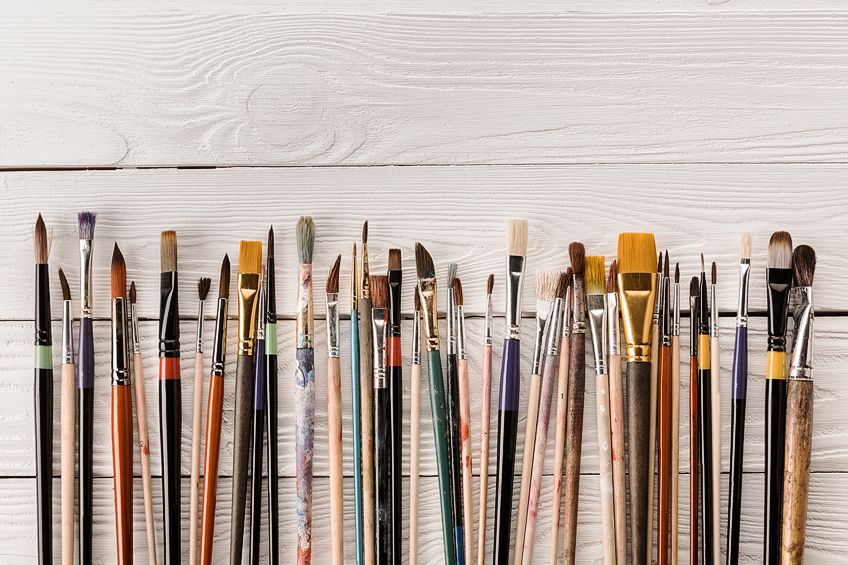
The focus of this article is to provide you with the know-how that will enable you to clean your paintbrushes. But before we explore this topic in greater depth, here are two tips that can help you maintain the quality of your brushes.
The first thing we would like to recommend is to be aware of how you are using your brushes, especially the new ones that are in good condition. Prodding and poking your canvas with a new brush is never advisable, for example – if you need to do this to apply thicker paint or create certain effects, rather use an old brush if you can.
The second thing you can do is to buy water-mixable oil paint (also known as water-soluble oils or water-miscible oils) that does not require the use of foul-smelling and toxic chemical products for cleaning. You can use water-mixable paints instead of pure oil paint. The benefits? Water-mixable oils still take a long time to dry if you do not dilute them with water, allowing you the gift of time to make any changes you need to make. They can be cleaned and diluted with water instead of smelly and potentially harmful solvents that are usually used.
Water-mixable paint retains a similar texture to normal paint and can be cleaned with water. Thinning it with water, however, does make the consistency a little more like water-color paint, which means that it dries a lot quicker than oil paint. Thinner paint that has been diluted should only be used as an undercoat if you prefer to retain the consistency of oil paint.
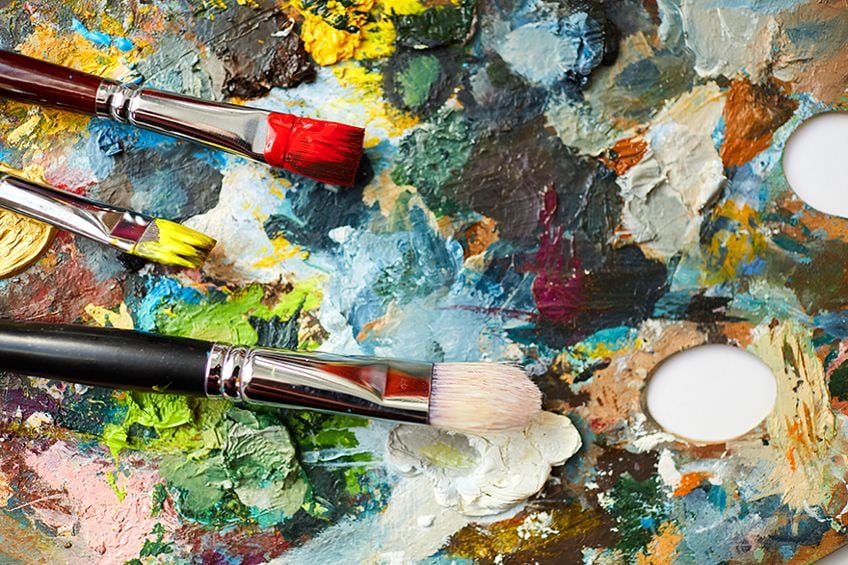
You can also purchase a specialized brush cleaner and preserver product to keep your brushes in tip-top shape at all times! General Pencil's "The Masters" Brush Cleaner and Preserver is the perfect product for such a task. Exceptionally quick and easy to use, simply wet your paintbrush in some warm water and then swirl the brush around in the soap until a lather forms. The lemon scent and efficacy of this product means that you will be able to clean all of your paintbrushes regularly and with ease.
In the next section, we will provide you with information on how to protect your brushes simply by using the correct cleaning methods so as to ensure that no remnant of paint is left on your brushes after using them.
Cleaning Oil Paint Brushes
The best way to clean paint brushes depends on whether you are using acrylic, oil, or water-based paints. This article is focused specifically on cleaning oil paintbrushes. One of the bonuses of choosing oil paints is that they take time to dry. While this irritates some people who opt for faster-drying paint like acrylic or watercolor, one positive thing about the slow drying time is that you can save your brushes without cleaning them (if you intend to use them within a few days of using the brush that is).
So, after you have finished a painting session with your oil paints, you can decide if you are going to use your brushes again within a few days after using them (in which case you do not have to clean them), or whether you will only use them again later.
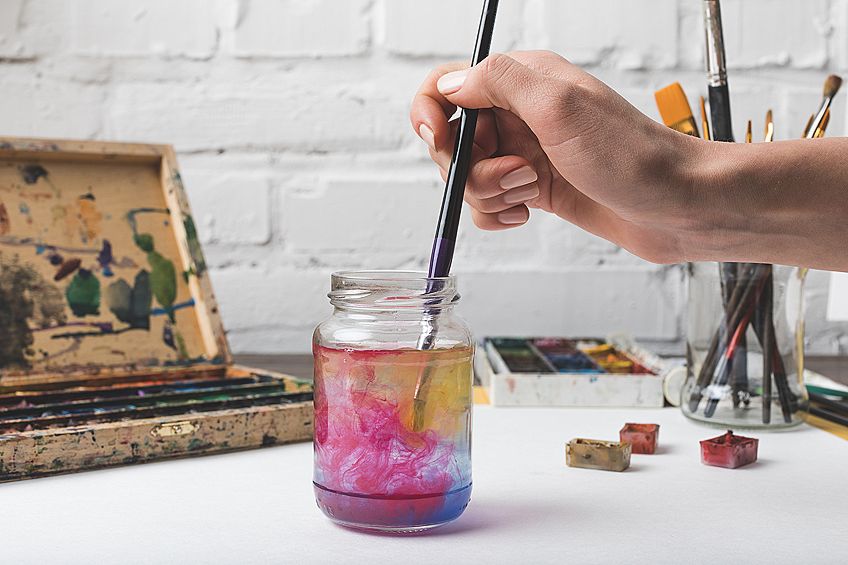
If you plan on using your brushes again soon, you will need to know how to clean oil paint brushes (or at least prevent them from drying out). The first thing you should do is remove as much of the paint on the brush as you can by wiping it thoroughly. Next, coat the brush in an oil that takes a while to dry. It may be tempting to opt for linseed oil to do this, but poppyseed oil takes longer to dry, so that should be your top choice. Artist-grade varieties should be available from most good art stores.
Once your brush is coated in oil, leave it to stand until your next painting session. Wipe off the excess oil and voila! You can start painting again. This is a much simpler route to take than cleaning your brushes, but sometimes it is just not possible to pick up the paintbrush as often as we would like and we have to put our brushes away for future use.
In these cases, you will need to use a solvent or oil and invest a little more time in the cleaning process.
How to Clean Oil Paintbrushes with a Solvent
If you do not plan on using your brush in the foreseeable future after you used it the first time, or if you are not sure when you will use it again, you will have to take the time to clean it thoroughly. Seen as a chore unworthy of effort by many, remember that using the correct cleaning method can help preserve your brush in the long run!
Thinners or turpentine are the go-to cleaning agents for removing oil paint from brushes. However, using products like these can damage the brush, ultimately causing the bristles to fall out. The reality is that cleaning your brush does not have to be an unpleasant and harmful process. If you are looking for a cheap oil brush cleaner that is less toxic, baby oil and linseed oil are affordable options that suit both beginners and amateurs.
In our opinion, the benefits of using oil as a paintbrush cleaner outweigh those of using solvents. One of the main reasons we say this is because oils are much gentler on your hands than solvents, and are better for your health in general. They are affordable and accessible and can have health benefits of their own too, depending on the type of oil you use.
Alternatively, you can purchase a solvent that has been formulated specifically for cleaning brushes whilst remaining non-hazardous. A great example is the popular brand Winsor and Newton's Brush Cleaner and Restorer solution, which is non-toxic, produces fewer vapors, and is biodegradable.

Baby Oil as a Paint Brush Cleaner
The first thing you want to do when using baby oil is to cover the bristles of your brush in the oil, ensuring that every hair of the brush is covered. Then the cleaning starts. You can either use your fingers or a cloth to start maneuvering the paint from the base of the brush to the tips of the bristles.
This process should be repeated as many times as it takes for the brushes to become as clean as possible. When you think they are as clean as they can get, soak them in a small amount of soapy water for a while. Then rinse them thoroughly, and let them dry in a well-ventilated area.
How to Clean Oil Paint off Brushes with Linseed Oil
Flaxseed oil is another name for linseed oil, so you may recognize it in your pantry before you think of using it as a paint remover. It is considered to be very healthy for consumption in small doses, with properties that make it beneficial for heart health. And the good news for oil painters is that it is also good for your skin. So, if you wanted another reason to choose oil-based cleaning agents instead of solvents, there you have it!
Linseed oil is a versatile liquid, and you may recognize it as a base in a variety of products. It is affordable and easily accessible – some grocery stores sell it, and more expensive artist-grade oils are sold at art stores.
Cleaning with this oil is no more demanding than using thinners or baby oil. Concerning how to clean oil paint off brushes using linseed oil, you can follow the same process for cleaning as the method described above for baby oil.
Or, if you are feeling creative, instead of wiping the paint-soaked oil off the brush with your hand or cloth, you can paint with it. To do this, coat the paintbrush with the oil, then simply use it as you would if it was covered in paint. Repeat this process. Like the method used for cleaning your paintbrushes with baby oil, once most or all of the paint has left your brush, clean it in soapy water and leave the brush to dry.
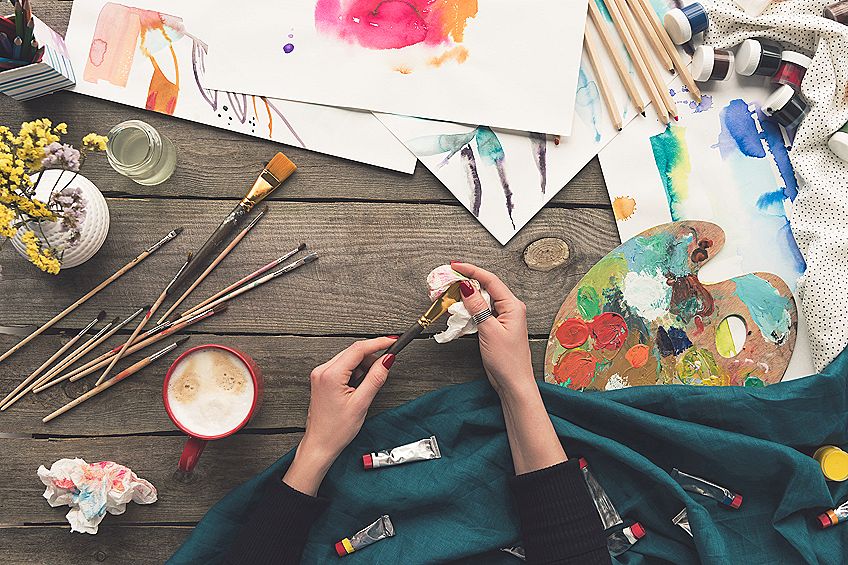
Cleaning Your Palette with Oil
You can also use oil to clean your palette if you want to further avoid all the problems associated with solvent use. If your palette is made from wood, the oil will be absorbed into the wood, which will help preserve it. To clean your palette with oil, you must first remove any excess paint by peeling or scraping it off and then wiping the rest of the pigment off with a cloth. Then, put some oil onto the palette and finish cleaning it by wiping it with a clean rag.
Dish Soap
Using dish soap as a paintbrush cleaner for removing oil from brushes is a controversial topic because some people think that it can cause damage to the bristles on your brush, especially when used in large quantities. Brushes with natural hair are particularly susceptible to damage.
The cup you use for your soap should preferably be an old one that you will use specifically for cleaning your brushes, as the cup may get stained during the cleaning process. Fill it with enough dish soap to cover the bristles on your paintbrush. Dip your brush into the soap, ensuring that all the bristles are coated, and follow the same process described for cleaning with baby oil and linseed oil.
You can also purchase specialized soap that has been formulated specifically for cleaning oil paint off of paintbrushes. One such product is Plantional's Oil Paint Brush Cleaner Soap, which uses a natural, non-toxic, and water-soluble vegetable oil solution to clean your paintbrushes of oil, acrylic, and watercolor paints, and even cosmetic makeup brushes.
How to Clean Dried Paint Brushes
We have spoken at length about the value of ensuring that your paintbrushes are cleaned before they dry. Before we talk about how to clean oil paint brushes with vinegar, note that sometimes a damaged brush is useful if you are needing to create different textures on your canvas, for example.
So, if you do have old brushes that have become deformed, or have a bit of dried paint stuck to the bristles, they may come in handy if you want to create different effects on your canvas. You do not necessarily have to throw out old brushes that are affected by dried paint.
If you do have brushes with dried paint on them, and you want to restore them to the best condition possible, all hope is not lost. You can soften the brushes by allowing the bristles to stand in white vinegar for a couple of minutes. Cleaning oil paint brushes with vinegar in this way will allow them to return to their original state., or as close as possible to their original condition. To do this, you should:
- Soak your brush in vinegar for about 60 minutes in a saucepan.
- Turn on the heat on your stove.
- Allow your brush to soak in the simmering vinegar for a few minutes.
- Rinse your brush in clean water.
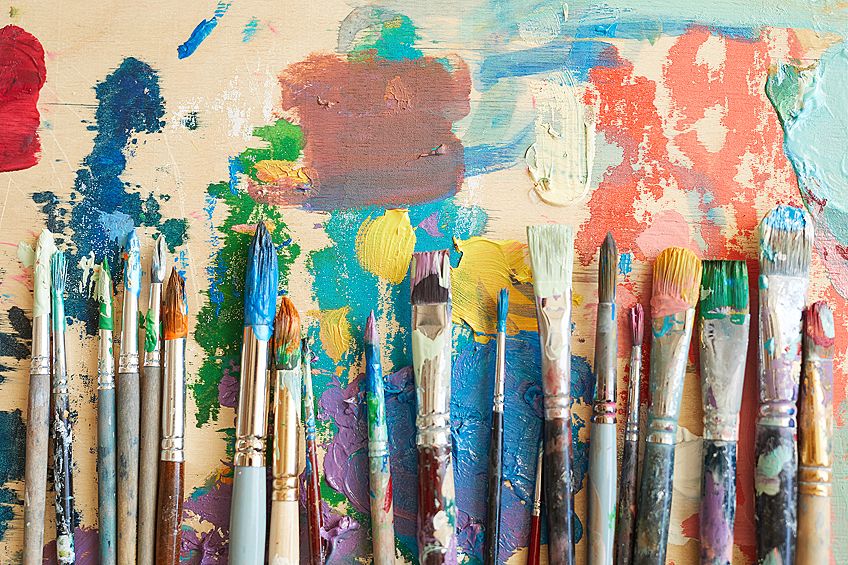
Drying Your Brush
Brushes should either be laid down to dry in a flat position or should be propped up with their bristles facing down. If they are facing skyward, there is a possibility that water may run down the handle and cause it to swell.
It may be tempting to leave your brush in water overnight to soak, as many of us do. However, this can cause the hairs of the brush to bend, and the water may also affect the handle. Once clean, store your brushes in a well-ventilated area that is not in direct sunlight.
Precautions
When using any of the cleaning agents described above (including the oil paints themselves), use them in a ventilated space or better yet, outside. The fumes can be toxic and, with continued use, cause damage to your respiratory system.
Both oil-based paints and cleaning agents can be flammable, so cleaning oil paint brushes, and indeed painting with oil-based paints, should not be done near flames or any other source of heat. For these two reasons, you should also be careful to keep all products away from children.
Finally, do not use oil paints or solvents if you have sensitive skin. The solvents dry skin out very quickly and make it more vulnerable to pigments being absorbed by your skin. To protect your hands, you can either use gloves or barrier cream. Neither of these options is particularly comfortable to use: The cream makes your hands greasy, and the gloves make your hands sweat. But taking these precautions can help protect your hands. Gloves do not need to be worn if you are using baby oil or linseed oil to clean your brushes, as these oils can be beneficial to your skin.

Frequently Asked Questions
What Do You Clean Oil Paint Brushes With?
You can use a solvent like thinners to clean your brushes. Baby oil and linseed oil also work well. Some artists use dish soap to clean their brushes, but this can be damaging to your brushes if you use too much soap. Artist-grade oils and solvents are available, or you can buy them at your local supermarket, hardware store, art store, or pharmacy, depending on which product you are looking for.
Can You Leave Oil Paint on Brushes Overnight?
Leaving your brushes to soak overnight is not the best way to clean paintbrushes, whether you are using oil, acrylic, or water-based paints. This is because the bristles can bend, forcing your brush to change shape. The wood on your brush can also be negatively affected. This is why leaving your brushes in any liquid overnight is not recommended.
How Do You Clean Oil Paint Brushes Without Paint Thinner?
The best alternative to thinners is baby oil or linseed oil. To use either of these oils, simply coat the bristles of your brush in the oil and use your fingers to rub the bristles thoroughly, without bending or breaking the hairs of the brush. Once you have repeated this process a few times and most of the pigment has been removed, you can rinse your brush in a small amount of dish soap in water.
How Long Can You Leave Oil Paint on Brushes?
Oil paint can be left on your brush for about an hour. If you intend to use your brush within a day or two after your first use, you can coat the bristles in oil (without cleaning your brush completely), and you will still be able to use it. If you do not do this, the oil paint will harden and your brush will be more difficult to clean.
Will Vinegar Clean Oil-Based Paint?
Most people use oils or solvents to clean their oil paintbrushes. Vinegar is best used for the softening of dried paint on brushes. To do this, soak your brush in vinegar for about an hour, then leave your brush in a saucepan of simmering vinegar for a few extra minutes. Rinse before use.
Keeping your brushes clean requires a bit of patience. Do it correctly, though, and you, your art, and the people enjoying your art will reap the rewards. If you want to avoid the harsh and offending fumes of solvents, clean your brushes effectively with baby oil or linseed oil. The ideal situation would be to avoid paint drying on your brushes, but if you do have dried paint on your brush, you can clean it off with vinegar.
How To Clean Hardened Oil Paint Brushes
Source: https://artincontext.org/how-to-clean-oil-paint-brushes/
Posted by: bessettemorce1984.blogspot.com

0 Response to "How To Clean Hardened Oil Paint Brushes"
Post a Comment